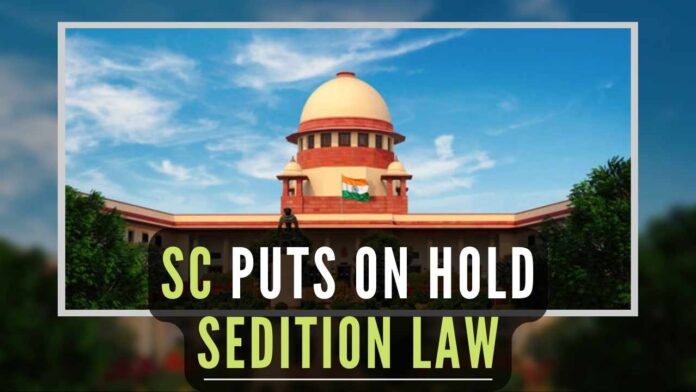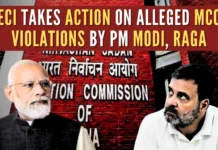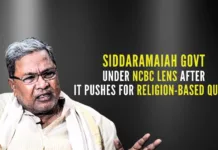
Is it high time to withdraw the Sedition Law (124A) and charge under UAPA?
In a landmark order, the Supreme Court on Wednesday put on hold the 152-year-old colonial sedition law till an “appropriate” Government forum re-examines it and directed the Centre and states to not register any fresh FIR invoking the offence. Rejecting the Centre’s reluctance in future FIRs, the bench headed by Chief Justice N V Ramana also ordered ongoing probes, pending trials, and all proceedings under the sedition law across the country to be kept in abeyance. The persons currently facing the sedition charges can approach the courts for bail, said the apex court.
Taking note of the concerns of the Centre, the apex court said the “rigours of Section 124A (sedition) of the IPC is not in tune with the current social milieu” and permitted reconsideration of the provision. “We expect that, till the re-examination of the provision is complete, it will be appropriate not to continue the usage of the aforesaid provision of law by the Governments,” said the bench, also comprising Justices Surya Kant and Hima Kohli. Any affected party is at liberty to approach concerned courts, which are requested to examine the reliefs sought to take into consideration the present order, the apex court said.
“This Court is cognizant of security interests and integrity of the State on one hand, and the civil liberties of citizens on the other. There is a requirement to balance both sets of considerations, which is a difficult exercise. The case of the petitioners is that this provision of law… pre-dates the Constitution itself, and is being misused…,” said the Bench, listing the matter in the third week of July and said its directions shall continue till further orders.
The order referred to the Centre’s affidavit, which accepted there were divergent views on the law and had also quoted Prime Minister Narendra Modi‘s favour in the protection of civil liberties and respect for human rights. “In view of the above, it is clear that the Union of India agrees with the prima facie opinion expressed by this Court… In light of the same, the Union of India may reconsider the aforesaid provision of law,” it said. The order said the interim stay granted to some petitioners by the apex court would continue to operate till further orders.
“All pending trials, appeals, and proceedings with respect to the charge framed under Section 124A of IPC be kept in abeyance. Adjudication with respect to other Sections, if any, could proceed if the Courts are of the opinion that no prejudice would be caused to the accused,” said the SC. If any fresh case is registered, the affected parties are at liberty to approach the courts for appropriate relief and the courts are requested to examine the reliefs sought, taking into account the present order passed as well as the clear stand taken by the Centre, it said.
The bench did not agree with the Centre’s suggestion that a superintendent of police ranked officers to be made responsible for monitoring the registration of FIRs for the offence of sedition. Solicitor General Tushar Mehta, appearing for the Centre, had also said the registration of FIRs on the matter cannot be prevented as the provision dealt with a cognizable offence and was upheld by a Constitution bench in 1962.
With regard to pending sedition cases, the Centre suggested that hearing on bail pleas in such matters may be expedited as the government did not know the gravity of the offence in all the cases and they may have terror or money laundering angles. “Ultimately, pending cases are before the judicial forum and we need to trust courts,” the law officer told the bench.
The bench, which rose for a few minutes to discuss the orders after taking note of the Centre’s response, came back to pronounce the directions and said it has considered the issues elaborately.
On Tuesday, the bench had asked the Centre to make clear within 24 hours its stand on keeping pending sedition cases in abeyance to protect the interests of citizens already booked and not registering fresh cases till the government’s re-examination of the colonial-era penal law is over.
Asking the Centre to take a clear stand after it had posed the two specific queries, the top court had agreed that a re-look of IPC’s Section 124A be left to the government.
Between 2015 and 2020, 356 cases of sedition — as defined under Section 124A of the IPC–were registered and 548 persons were arrested, according to data compiled by the National Crime Records Bureau (NCRB). However, just 12 persons arrested in seven sedition cases were convicted in this six-year period.
In July last year, CJI Ramana said the British used sedition law against Mahatma Gandhi and Tilak and asked whether it was still needed. Centre was evading from reply for nine months and the previous week, the apex court insisted reply. First Centre supported the sedition law by arguing to uphold the 1962 Kedarnath Saini judgment and after two days reversed the stand by saying that planning to re-consider the sedition law.
Salient points of SC order on sedition
States and Central government will be restrained from registering any FIR, continuing any investigation, no fresh probes, or taking any coercive measures by invoking Section 124A of the IPC while the provision is under consideration.
The affected parties currently facing sedition charges are at liberty to approach the concerned courts for appropriate relief including bail. The Courts are requested to examine the reliefs sought, taking into account the present order passed as well as the clear stand taken by the Centre.
All pending trials, appeals, and proceedings with respect to the charge framed under Section 124A of IPC e kept in abeyance. Adjudication with respect to other sections, if any, could proceed if the courts are of the opinion that no prejudice would be caused to the accused, it said.
Additionally, SC permitted the Centre to issue the directive as proposed to the states, and Union Territories (UTs) to prevent misuse of the provision.
PGurus is now on Telegram. Click here to join our channel and stay updated with all the latest news and views
For all the latest updates, download PGurus App.
- Supreme Court rejects plea to tally all VVPAT slips with EVM votes; says ‘no going back to paper ballot’ - April 26, 2024
- US report citing human rights violations is deeply biased: India - April 25, 2024
- Kotak Mahindra Bank shares tank 13%. Market Cap erodes by Rs.37,721 cr post-RBI action - April 25, 2024











Sedition law to be applied on Kapil Sibal for spreading false information. Anyone who spread false info, his professional licenses & education degrees to be cancelled & stand withdrawn till his death.